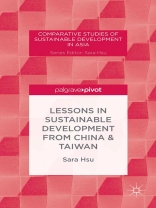Both Taiwan and China are extremely populous nations that, due to population pressures and continuing high growth levels, have experienced challenges in sustainable development. Hsu illustrates Taiwan’s path toward sustainable development and contrasts it to that of China, suggesting ways in which Taiwan can help China implement its environmental and social policies, and in which China might help Taiwan continue its path toward sustainable environmental and social policies. She explains that although Taiwan is a small compared to China, some aspects of its development model can (and should) be scaled up for larger countries. The importance of regulation enforcement is clear regarding Taiwan’s environmental protection program, as is the promotion of small and medium sized enterprises in promoting income and social equality. Similarly, China’s experimental methodology – using small areas to explore different ways of living or different technologies – can be useful in Taiwan. In Lessons in Sustainable Development, Hsu examines China and Taiwan in terms of inequality and environmental issues.
Зміст
1. Introduction 2. Theoretical Framework 3. Sustainable Development in Taiwan and China 4. Sustainable development programs and experiments 5. Directions for Future Study
Про автора
Sara Hsu is an Assistant Professor of Economics at SUNY New Paltz currently working on the Chinese Economy, Asian economic development, and informal and underground finance. Prior to working at SUNY New Paltz, Hsu was an Adjunct Professor at St. Edward’s University in Austin and Visiting Assistant Professor at Trinity University in San Antonio. She earned her Ph D in Economics from the University of Utah.












